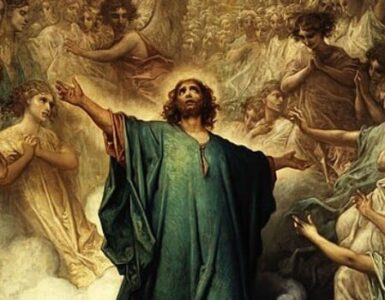Jesus took His apostles away for a quiet retreat after their exhausting preaching mission. It didn’t go exactly as planned. Why?
Gospel (Read Mk 6:30-34)
St. Mark tells us that when the apostles returned to Jesus after a busy mission of preaching and healing (see Mk 6:7-13), He wanted them to “Come away by yourselves to a deserted place and rest awhile.” They all went off in a boat so they could have an opportunity to catch their breath, because “people were coming and going in great numbers, and they had no opportunity even to eat.” This simple description gives us an idea of how intense Jesus’ public ministry got at times. It’s easy for us to forget that although there were times of quiet for Jesus and the Twelve, they lived and moved amidst crowds of people with pressing needs. This invitation to rest after their work is an echo of the Creation story, when God worked and then rested. Here, in the work of Redemption, there is the same rhythm of work and rest. The third of the Ten Commandments God gave to His people to regulate our spiritual and moral lives makes the Sabbath “rest” an obligation for man. God always commands what is best for us (not “rules” but light on our path). To be called to rest after our work is one of the clearest marks that we are made in the image and likeness of God. He worked and rested; so do we.
As we contemplate the refreshment Jesus and the apostles are anticipating in their “deserted place,” St. Mark draws back a curtain so we can see other action also taking place in this scene. “People saw them leaving and many came to know about it. They hastened there on foot…and arrived at the place before them.” Busted! It seems the people were determined not to let Jesus out of their sight. His plan to give some much-needed solitude to the apostles was thwarted by their desperation. St. Mark lets us feel the sharp clash of competing needs in this brief episode. We can imagine how the apostles must have longed for their boat to reach what they thought was an isolated destination. We can also imagine the fervor of the people to be as near Jesus as they could possibly get. How would this conflict get resolved?
St. Mark gives us only Jesus’ reaction (maybe that’s a good thing?): “When He disembarked and saw the vast crowd, His heart was moved with pity for them, for they were like sheep without a shepherd; and He began to teach them many things.” We can assume that Jesus Himself also desired rest from the constant pressure of the crowds. He most certainly desired it for the apostles. However, when He saw the lost look on the faces of the people who had tracked Him down, He could not resist them. He knew no one else could meet their aching need. He served them rather than Himself. He gave a powerful example of selflessness to the weary apostles, too. Ever the Good Shepherd, He lovingly fed His sheep.
We should be careful to savor these moments in the Gospels—times when we see Jesus moved to pity, in a deeply human way, for those in need. His tenderness and sympathy are real. His Sacred Heart beats with the same kind of human love that so imperfectly beats in our hearts, too. In our times of great need, when we do everything in our power to get His attention, let us not forget what we see here—we always have it.
Possible response: Lord Jesus, help me to know when I need to rest and when I need to serve others. May my heart be as tender as Yours.
First Reading (Read Jer 23:1-6)
We have to wonder if Jesus, in our Gospel story, had this Scripture in mind when He decided to answer the need of the crowd of people already gathered in the deserted place rather than take the rest He desired. Here, the prophet, Jeremiah, who lived in the 6th century B.C., delivered both a warning and a promise to God’s people. He warned the bad shepherds of coming woe because they had misled and scattered His flock through their covenant unfaithfulness. The kings of Israel were supposed to be good “shepherds,” as the original shepherd-king, David, had been. The sinful kings cared only for their own welfare, neglecting the care of the sheep. God, however, promised to “raise up a righteous shoot to David; as king He shall reign and govern wisely.” Jesus knew He was that king. The leaderless people He saw in the Gospel reminded Him of His mission. In His patient teaching “many things” to them, even in His exhaustion, He fulfilled Jeremiah’s prophecy of a coming king who would “do what is just and right in the land.” He is “The LORD, our justice.”
Possible response: Lord Jesus, thank You for leading us as a Shepherd-King. Thank You that we can trust Your Shepherd’s staff carried today by the bishops of Your Church.
Psalm (Read Ps 23:1-6)
This beautiful, familiar psalm extols the treasures of being a sheep in the Lord’s flock. It describes the kind of rest and security we can trust when we follow Jesus, the Good Shepherd of our souls. In peaceful times of feeding in “verdant pastures,” in times of travail as we walk “in the dark valley,” and even when we are face-to-face with our enemies, the Lord’s kindness and mercy are unfailing. Perhaps the people in the eager, anxious crowd in our Gospel story—the ones who outran a boat by hoofing it to the deserted place—had this psalm in mind when they saw that Jesus was ready and willing to care for them when He arrived. They, like us, could sing, “The Lord is my shepherd; there is nothing I shall want.”
Possible response: The psalm is, itself, a response to our other readings. Read it again prayerfully to make it your own.
Second Reading (Read Eph 2:13-18)
As often happens in our epistle reading, these verses from St. Paul can seem unrelated to the theme of our other readings—Jesus as our loving, tender Shepherd. However, we can best understand the relationship if we see that St. Paul is giving us an example of how Jesus is the Good Shepherd. We know from the other readings that Jesus listens to, guides, heals, and teaches us. Here we see that He has also done the miraculous work of bringing Jews and Gentiles together, by dying for all men, “that He might create in Himself one new person in place of the two, thus establishing peace, and might reconcile both with God, in one Body, through the Cross.” When we think of Jesus as the Good Shepherd, it is usually in very personal, individual terms—His kind mercy and tender love for me. Very true, of course. Yet Jesus loves the whole flock of God, and, in St. Paul’s day, the flock was deeply divided because of all the Jewish ritual separation (i.e., in worship, dietary laws, dress, observance of feast days, etc.) from Gentiles. Jesus abolished all those ritual laws, drawing all believers into Himself for salvation. “He came and preached peace,” says St. Paul, and then Jesus created peace by breaking down “the dividing wall of enmity” that kept Jews and Gentiles apart (possibly a reference to the wall in the Temple courtyard that kept praying Gentiles outside of its holy inner precincts). “For He is our peace,” and that is yet another reason we call Him the Good Shepherd.
Possible response: Lord Jesus, You gave Your life for all Your sheep. Help me love all Your flock as You do.
✠
Photo by Marcos Paulo Prado on Unsplash












